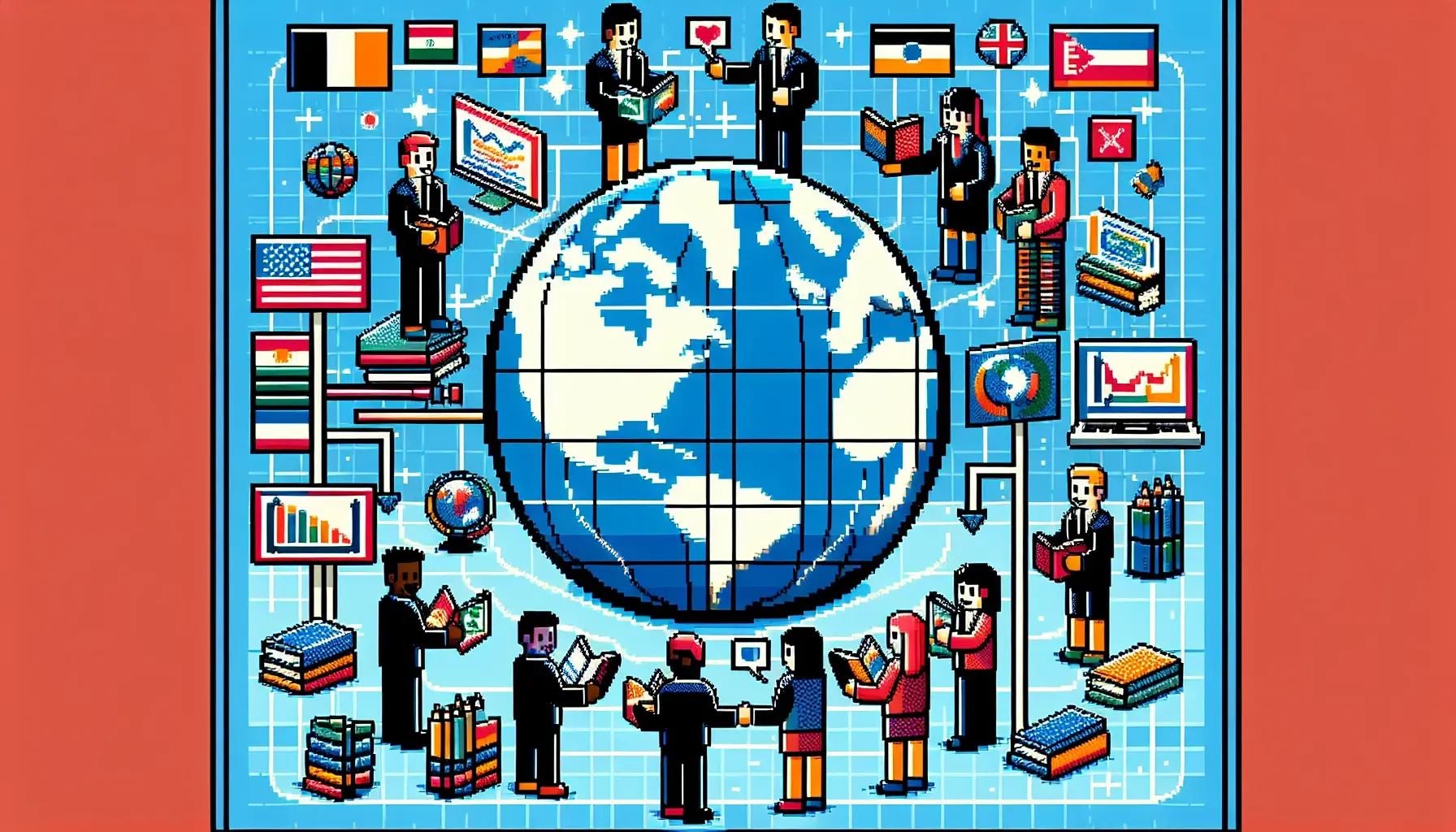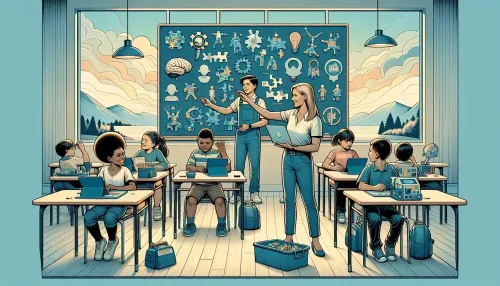The Global Talent Pool: Transforming Autism Education Through International Expertise

Harnessing global expertise to revolutionize educational outcomes for autistic children
The education of autistic children is a complex and dynamic field that benefits greatly from the infusion of diverse perspectives and expertise. Collaborations among educators from different corners of the world present a unique opportunity to enhance special education programs, ultimately improving the lives of autistic learners. In this article, we explore the impact of cross-border collaborations, international case studies, virtual exchange programs, and the challenges and opportunities of scaling successful models in the realm of autism education.
Cross-border Collaborations in Autism Education
Collaboration between educators across borders has increasingly become a cornerstone of innovation in special education programs for autistic children. By leveraging the diverse experiences and expertise of professionals from various cultural backgrounds, these collaborations bring fresh insights and methodologies into play. This exchange aims to better cater to the diverse learning needs of autistic children, fostering an inclusive educational environment that nurtures their individual potential.
Innovative Partnerships Enhancing Special Education
One notable example is the partnership between educators from Japan and the United States in developing a comprehensive sensory integration curriculum. By blending Japanese mindfulness practices with Western therapeutic techniques, the resulting program offers a holistic approach to addressing sensory challenges in autistic learners. Such cross-border collaborations not only enrich educational programs but also promote cultural understanding within the autism education community.
Case Study: Japan and the United States Collaboration
Global educator mobility has emerged as a double-edged sword in autism education. On one hand, it enables educators to gain exposure to diverse teaching methodologies and best practices from around the world. This mobility fosters professional growth and empowers educators with a broader toolkit to effectively support autistic children in their classrooms. However, it also presents challenges such as ensuring cultural sensitivity and adaptation of acquired knowledge within local contexts.
Effective management of global educator mobility calls for establishing standardized guidelines for knowledge transfer while respecting cultural nuances. By promoting professional development opportunities that facilitate the exchange of innovative strategies without imposing a one-size-fits-all approach, global educator mobility can be harnessed to its full potential in transforming autism education.
Benefits of Educator Mobility in Autism Education
Examining successful international case studies provides valuable insights into pioneering educational models that have significantly impacted autistic learners. The Scandinavian model, acclaimed for its inclusive education system, has demonstrated remarkable success in integrating autistic children into mainstream classrooms while providing individualized support tailored to their unique needs. This inclusive approach not only benefits autistic students but also fosters understanding and acceptance among neurotypical peers, promoting an inclusive society at large.
Furthermore, initiatives in Australia that prioritize early intervention through parent-professional partnerships have yielded positive outcomes, emphasizing the importance of collaborative efforts in supporting autistic children during their formative years. These case studies highlight how international expertise can inform innovative approaches that transcend geographical boundaries, ultimately shaping more effective educational interventions for autistic learners worldwide.
International Case Studies in Autism Education
In an era defined by digital connectivity, virtual exchange programs have emerged as a powerful tool for breaking down geographical barriers in educator training. Through online platforms, educators can engage in collaborative learning experiences with peers from diverse cultural backgrounds, fostering a global network of expertise in autism education. Virtual exchanges offer a cost-effective and accessible avenue for professional development, enabling educators to stay abreast of cutting-edge practices and research without being constrained by physical distance.
Pioneering Models from Scandinavia and Australia
By participating in virtual exchange programs, educators acquire a nuanced understanding of how cultural differences intersect with educational methodologies, enriching their ability to tailor interventions that resonate with diverse groups of autistic learners. This paradigm shift towards virtual collaboration promises to democratize access to global expertise while promoting continuous professional growth within the autism education community.
The Role of Virtual Exchange Programs in Training Educators
Unifying educational curricula to meet diverse cultural needs within autism education presents multifaceted challenges. While pedagogical approaches may vary across cultures, it is imperative to ensure that educational curricula uphold universal standards of inclusivity and equity for all autistic children. Balancing cultural specificity with internationally recognized best practices demands a nuanced approach that respects cultural diversity while safeguarding fundamental rights to quality education.
Benefits of Online Collaboration for Educators
Moreover, addressing linguistic diversity poses a significant challenge in curriculum adaptation, particularly when imparting essential communication skills to non-verbal or minimally verbal autistic learners from different linguistic backgrounds. Successful adaptation necessitates collaboration with linguists and cultural experts to design inclusive language frameworks that cater to these unique needs without undermining linguistic diversity. Ultimately, navigating these challenges calls for an integrated approach that embraces diverse cultural perspectives while upholding core principles of effective autism education.
The journey from local innovation to global implementation represents a pivotal stage in leveraging successful models within autism education. Effectively scaling proven interventions demands strategic coordination among stakeholders at local, national, and international levels. Establishing robust networks for knowledge sharing and advocating for policy reforms are instrumental in propelling successful models from localized initiatives to global impact.
Challenges in Adapting Curricula for Cultural Diversity
By streamlining dissemination channels through digital platforms and community engagement initiatives, successful models can transcend geographical boundaries, benefitting autistic learners worldwide. Additionally, collaborative efforts in establishing standardized evaluation frameworks enable stakeholders to measure the replicability and impact of these models across diverse cultural settings. This concerted approach facilitates sustainable scalability while upholding fidelity to the core principles that underpin successful interventions tailored for autistic children.
Frequently Asked Questions
Cross-border collaborations in autism education involve partnerships between educators from different countries to share insights and methodologies. These collaborations enhance special education programs by integrating diverse cultural perspectives, ultimately improving educational outcomes for autistic children and fostering an inclusive learning environment.
Global educator mobility allows teachers to learn from diverse teaching methodologies worldwide, enriching their professional growth. However, it also presents challenges such as ensuring cultural sensitivity and adapting knowledge to local contexts, which must be managed effectively to benefit autistic learners.
The Scandinavian model is known for its inclusive education system that successfully integrates autistic children into mainstream classrooms. It emphasizes individualized support tailored to each child's unique needs, promoting understanding and acceptance among neurotypical peers while fostering an inclusive society.
Virtual exchange programs enable educators to collaborate with peers globally through online platforms, enhancing their training without geographical constraints. These programs provide access to innovative practices and research, fostering a global network of expertise that enriches the learning experience for autistic children.
Adapting curricula for autistic learners involves addressing cultural diversity and linguistic differences. It's crucial to balance cultural specificity with universal standards of inclusivity while collaborating with experts to develop frameworks that cater to the unique communication needs of non-verbal or minimally verbal students.
Scaling successful models in autism education requires strategic coordination among stakeholders at various levels. Establishing networks for knowledge sharing, advocating for policy reforms, and using digital platforms can help disseminate effective interventions globally while maintaining fidelity to core educational principles.
Cultural differences significantly influence teaching methods in autism education. Educators must consider these differences when implementing strategies to ensure they resonate with diverse groups of autistic learners. This awareness promotes effective communication and fosters an inclusive educational environment that respects individual backgrounds.
Yes, standardized guidelines are essential for effective global educator mobility. They help ensure that knowledge transfer respects cultural nuances while promoting best practices. By establishing these guidelines, educators can adapt innovative strategies effectively within their local contexts, benefiting autistic learners more comprehensively.
Check Out These Related Articles

Autism and Education: Enhancing Learning for Autistic Children

Learning Adventure: Creative Educational Approaches to Cater to Autistic Childrens Diverse Learning Styles

Educational Evolution: The Effect of Policy Reform on Special Needs Curriculum
